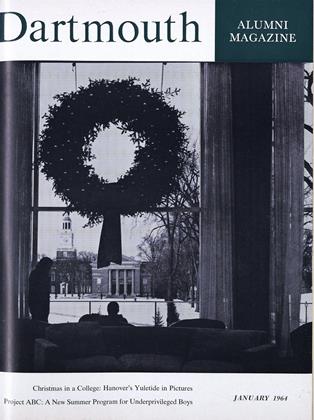Selectedby William Cole. New York: Simon andSchuster, 1963. 322 pp. $5.95.
Devotees of the writings of A. J. Liebling '24 are an enthusiastic and unsatiated lot, not unlike those of the late Wolcott Gibbs and of E. B. White, both identified with TheNew Yorker, which serves also as the prime vehicle of Liebling's puckish, disarmingly learned, prose masterpieces. The Most ofA. J. Liebling is a wide-ranging collection of some of the best things Joe Liebling has written in the past 25 years or so, and as such it is a happy reprise for the devotees and an excellent introduction for those who are reading him for the first time.
Whatever the Liebling subject might be, and he loves the offbeat as often as not, he handles it with a sharp reportorial eye and a superb gift for writing. The mind behind the eye is also sharp (and irreverent), and part of the Liebling appeal surely comes from the reader's impression of a highly intelligent craftsman who doesn't spurn the demi-monde as subject matter. With equal relish Mr. Liebling can write about Hymie Katz, the tummler, or sit on the Hanover Inn porch reading Old French.
Mr. Cole's selections for The Most ofA. J. L. are drawn mainly from Liebling's eight previous books, which include TheRoad Back to Paris, The Wayward Pressman, and The Earl of Louisiana. The celebrated piece on Harold Ross first appeared in the Nieman Reports. All the subjects dearest to Liebling's heart are represented - France, World War II, the press, good wine, good food, boxing, horseracing, and New Yorkers, especially the peerless Colonel Stingo, he of the pointy shoes and fascinating memoirs. To the devotees some of the selections will seem outrageously brief, but Liebling, in a foreword, says that he himself could not have held the manuscript below a million words, so someone else naturally had to do the job.
Even so, this is a lot of Liebling in one book- maybe the most, as it says - which means it is a book to be unhesitatingly recommended.
 View Full Issue
View Full Issue
More From This Issue
-
 Feature
FeaturePROJECT ABC
January 1964 -
 Feature
FeatureThe Friends' Best Friend
January 1964 -
 Feature
FeatureCHRISTMAS IN A COLLEGE
January 1964 -
 Article
ArticleTHE UNDERGRADUATE CHAIR
January 1964 By DAVE BOLDT '63 -
 Class Notes
Class Notes1933
January 1964 By JUDSON T. PIERSON, GEORGE N. FARRAND -
 Class Notes
Class Notes1930
January 1964 By WALLACE BLAKEY, HARRISON F. CONDON JR.
C. E. WIDMAYER '30
-
 Sports
SportsHockey
February 1934 By C. E. Widmayer '30 -
 Sports
SportsINDIANS INVADE PRINCETON
April 1934 By C. E. Widmayer '30 -
 Sports
SportsDEFENSIVE PLAY STRESSED
November 1934 By C. E. Widmayer '30 -
 Sports
SportsFOLLOWING THE BIG GREEN TEAMS
February 1935 By C. E. Widmayer '30 -
 Sports
SportsFOLLOWING THE BIG GREEN TEAMS
May 1935 By C. E. Widmayer '30 -
 Sports
SportsGym
May 1935 By C. E. Widmayer '30
Books
-
 Books
BooksAlumni Publications
January 1945 -
 Books
BooksBig Bucks, Big Muscle
December 1980 By Alfred T. Quirk '49 -
 Books
BooksIntroduction to Medical Biometry and Statistics
August 1924 By C. H. Forsyth -
 Books
BooksFACULTY PUBLICATIONS
November, 1025 By Franklin Mcduffee, Frank Maloy Anderson -
 Books
BooksTHE FEAR OF CONSPIRACY: IMAGES OF UN-AMERICAN SUBVERSION FROM THE REVOLUTION TO THE PRESENT.
OCTOBER 1971 By PETER SLATER -
 Books
BooksALUMNI PUBLICATIONS
January 1922 By R. A. D.

